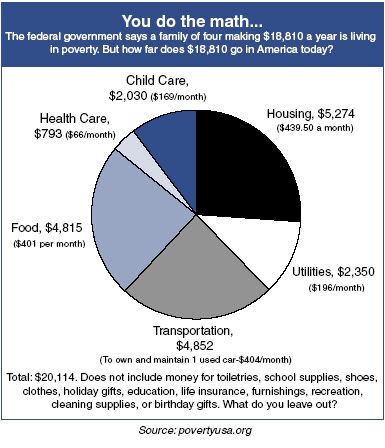Ending Poverty for the Average Federal Employee
So today let's note a rather unusual book out there in the slew of presidential hopeful pulp-novelas: Ending Poverty in America: How to Restore the American Dream. The book contains only an essay by Democratic hopeful John Edwards, and the meat of the book at least isn't endless puffing about how he's going to fix everything that's wrong with you. Instead, it's a collection of essays by both liberals and conservatives, produced by the Center on Poverty, Work and Opportunity. These essays are scientifically based studies of the nature of poverty and both the successes and failures of recent American policy in creating a fair economy for all of us. The collection begins centered around a simple set of irrefutable statistics:

What does a poverty statistic mean on a personal level? How accurate is this idea that passing over $19,874 will enable parents to care for two children? Heck, what about single young women working for the federal government to defend the nation against terrorism? Let's calculate the cost of living for one such employee: $9,600 Rent ($800 a month, 1 bedroom), $1,960 Food ($35 a week), $2400 Gas (1 hour commute), $740 Insurance USAA, $396 Work Parking Permit, $1,920 Retirement Savings, $1,440 Health Insurance Co-Pay, $140 Prescriptions (No Birth Control), $100 Emergency Room Co-Pay, $230 New Tires, $480 Cell Phone, $252 Internet Services, $60 Bank Fees, $370 Vet Bills for 1 Cat, $1,940 Car Repairs, $120 AAA, $60 (3 $20) Haircuts, $270 Plane ticket to see dying grandfather, $120 Contact Lenses, $180 Dentist plus x-rays, $380 Holiday Gifts (including Birthdays and Christmas). Not included: Thanksgiving Dinner, Booze, Christmas Tree, Easter Eggs, clothing of any kind, movie tickets, books or magazines, Starbucks, Halo 3, dating, make-up, cable television, laundry detergent. Yes, I need the Internet, as a college student. The cell phone serves as a stand in for a land line. Total Cost for 1 Year: $23,158.
Base Salary? $23,700. A cost of living adjustment raises the total to $27,100. After $3,523 in federal taxes and $813 in state taxes, take home pay would equal $22,764. Rumors on several job sites are that pay is $33,000 and that is not true. For those of you who are curious, the cost in salary and benefits of TSA for 2007 will cost $3.45 billion, at an approximate cost of $1.91 per passenger, and $1.65 per checked bag. The cost per passenger includes the cost of screening carry-on luggage. How interesting it would be to ask passengers how much they think it costs to screen them in terms of labor. The above recounting of expenses includes $26 in prescription co-pays for medication after needing four stitches for an on-the-job-injury, my second in as many years after surviving ten years in retail with a clean record.
Edward's book notes that "One in four people who work full-time, year round, still earn less than the amount of money needed to keep a family of four above the poverty threshold... The single parent with three children, working a full 40 hours a week for 52 weeks a year, must earn $9.55 an hour to stay at the poverty line." So basically what you have here is the cold hard economic fact that a fighting the war on terror won't even allow you to provide for yourself, let alone a spouse and two children, without massive government assistance or going without health insurance. And several of my coworkers follow the later track in order to come up with money for their families, betting against the odds that all of their medical needs can be solved with extra sleep and Tylenol. Times I have required medical care in the past year? Three times with my family practice and one emergency room visit after an allergic reaction to a steroid inhaler in the middle of the night. Not that I am completely innocent, I agree, having twice had overdraft charges of $34 dollars for a total of $68 in the past year.
The Congressional Budget Office reports that between 1979 and 2000, the income of the top 1% of Americans grew 184%. Top 5th grew 70%. The real income of the bottom 5th grew only 6%. Edwards's book notes that inter generational mobility has stagnated to the point that "it would take a poor family of four with two children approximately 9 to 10 generations- over 200 years- to achieve the income of the middle-income four-person family... A son whose father earns about $16,000 a year has only a 5% chance of earning over $55,000 per year." Meanwhile, the CBO has just released two estimates of the cost of staying in Iraq. For the favored Republican scenario of continued combat operations, the estimated cost is $25 billion per year. For the favored Democrat scenario of non-combat peace-keeping operations, the estimated cost is only $10 billion per year. Both scenarios use conservative estimates on the necessity to replace equipment and armor. Some one's going to have to pay for all of this, and sorry to you war-mongers out there, but this federal employee is running in the budgetary red.
More voices are speaking up about what our money has been buying us in Iraq: Foreign Policy's Terrorism Index.

Americans need to get over their love affair with movie stars and cowboys as Presidents. Certainly doesn't make the world safer, or fairer, or more democratic. As a democrat, I want a renewed commitment to the ideals of democracy, towards compassion and justice. I want to see America renewed in the beauty that democracies are able to produce, in their bustling cities and the equal allocation of riches to it's people, the wealthy and the worker. Instead of tax breaks for corporations, I want workers to have the right to show each other their paychecks without getting fired. Instead of private mercenaries used to secure oil reserves, I want trained and armored US soldiers deployed to end on-going genocide. I want to be able to travel to my job on public transportation, I want utility companies brought under control, I want spammers put out of business. And I want the American Dream for myself, to be able to put away money for a new car and use my tuition to reduce my tax-burden even though I don't itemize.
I want a President who believes in the noble endeavor that democratic government was created to bring about in the world, instead of being pledged to destroy it in the name of private profit. John Edwards saves his remarks until everyone else at his Center has been given a chance to contribute, and he makes a point of including everyone's good ideas towards creating a wonderful future for America... both conservatives and liberals. And it's a good vision, about us as a people... a way to give up terror and war, in exchange for hope and peace.

Technorati Tags:
John Edwards, politics, current affairs, economics, poverty, health insurance, homeland security, war on terror, Iraq, moonbat
"In 2005, 37 million Americans- about 1 in 8 people- lived below the income poverty level, defined as $19,874 for a family of 4. Almost 13 million were children under 18... The income gap between the rich and poor is growing as well: in 2005 the top 20% of U.S. households received over half of all income, while the bottom 20% of households received only about 3% of total income. Wealth inequalities are also on the rise: in 2004 the top 1% of households by income held more than a third of all net worth and financial assets. Approximately 80% of stock is held by the top ten percent of wealthy households; the poorest 40% of households own less than 1% of all stocks... Over 46 million Americans (about 16% of the population) lacked health insurance coverage in 2005... over 27 million workers are employed with no health insurance."

What does a poverty statistic mean on a personal level? How accurate is this idea that passing over $19,874 will enable parents to care for two children? Heck, what about single young women working for the federal government to defend the nation against terrorism? Let's calculate the cost of living for one such employee: $9,600 Rent ($800 a month, 1 bedroom), $1,960 Food ($35 a week), $2400 Gas (1 hour commute), $740 Insurance USAA, $396 Work Parking Permit, $1,920 Retirement Savings, $1,440 Health Insurance Co-Pay, $140 Prescriptions (No Birth Control), $100 Emergency Room Co-Pay, $230 New Tires, $480 Cell Phone, $252 Internet Services, $60 Bank Fees, $370 Vet Bills for 1 Cat, $1,940 Car Repairs, $120 AAA, $60 (3 $20) Haircuts, $270 Plane ticket to see dying grandfather, $120 Contact Lenses, $180 Dentist plus x-rays, $380 Holiday Gifts (including Birthdays and Christmas). Not included: Thanksgiving Dinner, Booze, Christmas Tree, Easter Eggs, clothing of any kind, movie tickets, books or magazines, Starbucks, Halo 3, dating, make-up, cable television, laundry detergent. Yes, I need the Internet, as a college student. The cell phone serves as a stand in for a land line. Total Cost for 1 Year: $23,158.
Base Salary? $23,700. A cost of living adjustment raises the total to $27,100. After $3,523 in federal taxes and $813 in state taxes, take home pay would equal $22,764. Rumors on several job sites are that pay is $33,000 and that is not true. For those of you who are curious, the cost in salary and benefits of TSA for 2007 will cost $3.45 billion, at an approximate cost of $1.91 per passenger, and $1.65 per checked bag. The cost per passenger includes the cost of screening carry-on luggage. How interesting it would be to ask passengers how much they think it costs to screen them in terms of labor. The above recounting of expenses includes $26 in prescription co-pays for medication after needing four stitches for an on-the-job-injury, my second in as many years after surviving ten years in retail with a clean record.
Edward's book notes that "One in four people who work full-time, year round, still earn less than the amount of money needed to keep a family of four above the poverty threshold... The single parent with three children, working a full 40 hours a week for 52 weeks a year, must earn $9.55 an hour to stay at the poverty line." So basically what you have here is the cold hard economic fact that a fighting the war on terror won't even allow you to provide for yourself, let alone a spouse and two children, without massive government assistance or going without health insurance. And several of my coworkers follow the later track in order to come up with money for their families, betting against the odds that all of their medical needs can be solved with extra sleep and Tylenol. Times I have required medical care in the past year? Three times with my family practice and one emergency room visit after an allergic reaction to a steroid inhaler in the middle of the night. Not that I am completely innocent, I agree, having twice had overdraft charges of $34 dollars for a total of $68 in the past year.
The Congressional Budget Office reports that between 1979 and 2000, the income of the top 1% of Americans grew 184%. Top 5th grew 70%. The real income of the bottom 5th grew only 6%. Edwards's book notes that inter generational mobility has stagnated to the point that "it would take a poor family of four with two children approximately 9 to 10 generations- over 200 years- to achieve the income of the middle-income four-person family... A son whose father earns about $16,000 a year has only a 5% chance of earning over $55,000 per year." Meanwhile, the CBO has just released two estimates of the cost of staying in Iraq. For the favored Republican scenario of continued combat operations, the estimated cost is $25 billion per year. For the favored Democrat scenario of non-combat peace-keeping operations, the estimated cost is only $10 billion per year. Both scenarios use conservative estimates on the necessity to replace equipment and armor. Some one's going to have to pay for all of this, and sorry to you war-mongers out there, but this federal employee is running in the budgetary red.
More voices are speaking up about what our money has been buying us in Iraq: Foreign Policy's Terrorism Index.
"The outcome of the war in Iraq may now rest in large part on the success or failure of the so-called surge. Beginning in February, the White House sent an additional 28,000 U.S. troops to Baghdad in an effort to quell the violence there. Securing the capital with overwhelming force is a key component of the anti-insurgency plan developed by Gen. David Petraeus, the top U.S. commander in Iraq and the military’s foremost expert on counterinsurgency tactics. It took until June for all the U.S. forces to be put in place, and the number of American troops in Iraq is now at its highest level since 2005. But is Petraeus’s plan working?
The index’s experts don’t think so. More than half say the surge is having a negative impact on U.S. national security, up 22 percentage points from just six months ago. This sentiment was shared across party lines, with 64 percent of conservative experts saying the surge is having either a negative impact or no impact at all. When the experts were asked to grade the government’s handling of the Iraq war, the news was even worse. They gave the overall effort in Iraq an average point score of just 2.9 on a 10-point scale. The government’s public diplomacy record was the only policy that scored lower.
These negative opinions may result in part from the experts’ apparent belief that, a decade from now, the world will still be reeling from the consequences of the war. Fifty-eight percent of the index’s experts say that in 10 years’ time, Sunni-Shiite tensions in the Middle East will have dramatically increased. Thirty-five percent believe that Arab dictators will have been discouraged from reforming. Just 5 percent, on the other hand, believe that al Qaeda will be weaker, whereas only 3 percent believe Iraq will be a beacon of democracy in the Middle East. If true, the surge, or any other tactical shift for that matter, was probably already too little, too late."

Americans need to get over their love affair with movie stars and cowboys as Presidents. Certainly doesn't make the world safer, or fairer, or more democratic. As a democrat, I want a renewed commitment to the ideals of democracy, towards compassion and justice. I want to see America renewed in the beauty that democracies are able to produce, in their bustling cities and the equal allocation of riches to it's people, the wealthy and the worker. Instead of tax breaks for corporations, I want workers to have the right to show each other their paychecks without getting fired. Instead of private mercenaries used to secure oil reserves, I want trained and armored US soldiers deployed to end on-going genocide. I want to be able to travel to my job on public transportation, I want utility companies brought under control, I want spammers put out of business. And I want the American Dream for myself, to be able to put away money for a new car and use my tuition to reduce my tax-burden even though I don't itemize.
I want a President who believes in the noble endeavor that democratic government was created to bring about in the world, instead of being pledged to destroy it in the name of private profit. John Edwards saves his remarks until everyone else at his Center has been given a chance to contribute, and he makes a point of including everyone's good ideas towards creating a wonderful future for America... both conservatives and liberals. And it's a good vision, about us as a people... a way to give up terror and war, in exchange for hope and peace.

"The American people understand that no one who works full-time should live in poverty... Let us set a national goal-the elimination of poverty in America in 30 years. It will not be easy, but I believe in the unlimited power of the American people to accomplish anything we set our hearts and minds to acheive. If we do not rest until poverty is history, it will be."
Technorati Tags:
John Edwards, politics, current affairs, economics, poverty, health insurance, homeland security, war on terror, Iraq, moonbat
Labels: 2008, anti-war, democracy, economics, economy, Homeland Security, Iraq, John Edwards, war on terror




0 Comments:
Post a Comment
<< Home